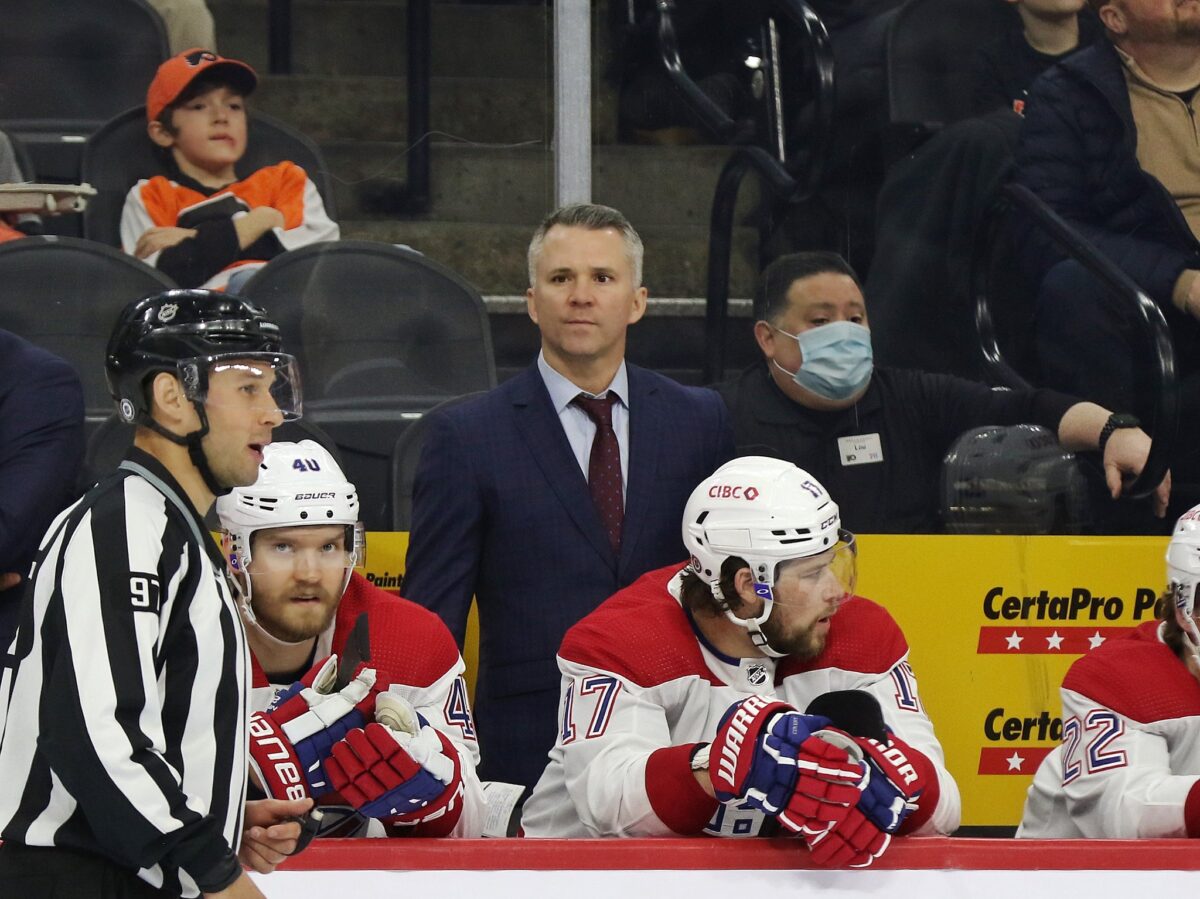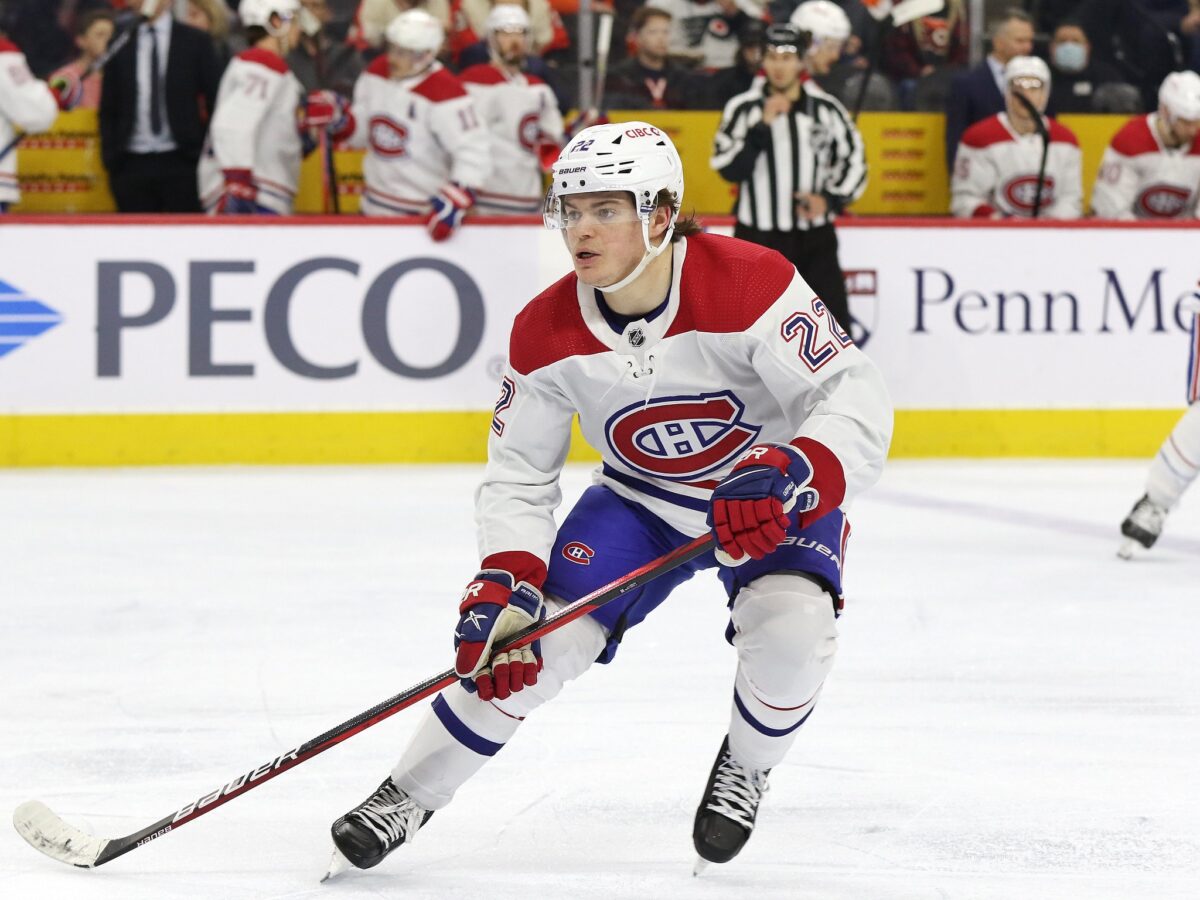It wasn’t a secret that the Montreal Canadiens and Martin St. Louis were a good fit. General manager Kent Hughes was clear that he wanted him to return and the formalities are now out of the way as he has been signed to a 3-year deal and will be back behind the bench for the 2022-23 season.
There was always a good fit with St. Louis as he and Hughes wanted the Canadiens to play the same style, fast-paced, skillful hockey with a focus on offense. Habs fans would remember that being called Firewagon hockey. Over his 37 games last season, he was able to ease the team into playing as close to that style as their skill level would allow.
Now the hard work is set to begin as new systems and concepts will need to be planned out to help a young team that finished 32nd last season take a step forward in their development and the standings. A quick look at what St. Louis brought as a rookie coach with no NHL experience inspires hope for the Canadiens’ development moving forward.
St. Louis Has Good Communication Skills
The basis of any good coach, in any sport, is communication and St. Louis is well known for that skill. At his end-of-year press conference, Hughes called him a “fantastic communicator with emotional intelligence” who can get the most out of his players.
Executive vice president Jeff Gorton told TSN that,
“…anyone that’s in that dressing room every day, you can kind of see the impact that Marty brings. He’s a natural-born leader, he has a high energy, he’s got a passion for the game, he belongs in the game…”
– Jeff Gorton
St. Louis’ experience as an NHL player who has had to earn his roles does show an emotional IQ for how he can read individual players. This is a skill that will be useful in developing this young team during their current rebuilding phase. An example of this was how he eased newly signed defenceman Jordan Harris into the lineup and communicated his expectations.
“Towards the beginning, when I first joined the team, (St. Louis) was like: ‘Hey, you’re going to mistakes. You’re going to want three or four plays back at the end of the game,’ and that really meant a lot to me that he said that because it kind of lifts a little weight off your shoulders and allows you to just go out there and try to play your game. I haven’t been perfect, I’ve made plenty of mistakes over the games, but that’s just stuff you can learn from. I think I’m fortunate to have a coach like Marty who allows players to make reads and make mistakes and go back out on the ice. I’m definitely grateful for that.” – Jordan Harris (from ‘Stu Cowan, A Lost Season but the Canadiens Took an Important Step Forward, Montreal Gazette’, 4/29/22)
This type of communication is essential in team building, but it takes consistent daily two-way communication. Doing that means getting to know the players not only for their on-ice abilities but also as individuals. Building relationships will continue to be a key weapon in St. Louis’ arsenal, and one that will become his main method of building the mentorship he will need to allow this team to move forward.
St. Louis Key for Player Development
Allowing players to make mistakes and learn from them without the pressure of thinking they would be benched for making them is a large part of developing young players. As seen above with Harris’ comments, St. Louis is already allowing that growth to occur organically. Having a team that the fans have no expectations from is also helpful, as the pressure to win every night isn’t there and no one is afraid to lose their jobs.
Related: Montreal Canadiens 2021-22 Season Learning Lessons in Failure
During St. Louis’ practices, he has focused on small area play, something that allows players to build their reaction times and improve their ability in reading plays while relying on their instincts or hockey IQ. This has allowed him to instruct individuals on their understanding of risk management. Under previous coaching regimes, the focus was on a more defence-oriented style, where systems have relied upon more than skill. In a league where “safe is death”, mentoring young players in risk management means they can focus on the offensive side of the game while learning how to incorporate defense in helping to create transition and offense. An approach that fits the modern style of play in the NHL.

That approach has already paid dividends as you would be hard-pressed to find a player’s performance that diminished after St. Louis’ arrival or a statistical aspect of their games that didn’t improve, as Nick Suzuki’s offensive output increased, and Jeff Petry was able to rediscover his game. However, Cole Caufield is the perfect example of the impact St. Louis’ coaching has brought. He started the season with only one goal and eight points in 30 games under former head coach Dominique Ducharme. In 37 games under St. Louis, he scored 22 goals and 35 points, which, if that pace was stretched over an 82-game season would have led to a 49-goal and 77-point rookie season.
Another player whose performance took a dramatic turn for the better was Christian Dvorak who had 17 points in 22 games under the new coach, which is a 64-point pace over 82 games. He also finished the season with a 56.7% success rate on faceoffs. If that trend was consistent, no one would have been upset with the cost of a first and third-round pick to acquire him as he would have been an ideal candidate to be a second-line center, especially with his $4.45 million cap hit.
Canadiens Improvements
The Canadiens’ improvement in the second half of the 2021-22 season under St. Louis as compared to the first half was no mirage, as there were significant steps forward in the team’s overall offensive game. Under Ducharme, the team was 31st in total goals for (GF). After St. Louis’ hiring on Feb. 9, the Habs’ total GF over that time was 15th in the NHL. Defensively, the team was 32nd in goals allowed under Ducharme. Since St. Louis’ arrival, the Habs edged their way up to the 27th worst defense. This is the main area where improvements in the players’ understanding of how to apply risk management in their games will have an impact on the standings.
On special teams, we also saw a slight shift in philosophy, not so much in the system deployed, but in the personnel used. The power play (PP) is the better example as St. Louis began to use Caufield in a significant role on the top unit, giving him 60 to 90 seconds per PP. In those 37 games, Caufield’s point production of 13 points meant he ended up factoring into 39% of all PP goals over the entire season. A full year in that role could have meant a significant improvement for a PP in desperate need of help.

St. Louis’ contract extension was well earned. His approach to the game fits with the style the GM wants for the team. Also, the players are responding to his approach and communication style. While there will need to be significant work on building a plan for the team’s defense and youth development next season, he has shown that he is capable of stepping up to any challenge he is faced with. As a result, the Canadiens seem to be in good hands going into the 2022-23 season.